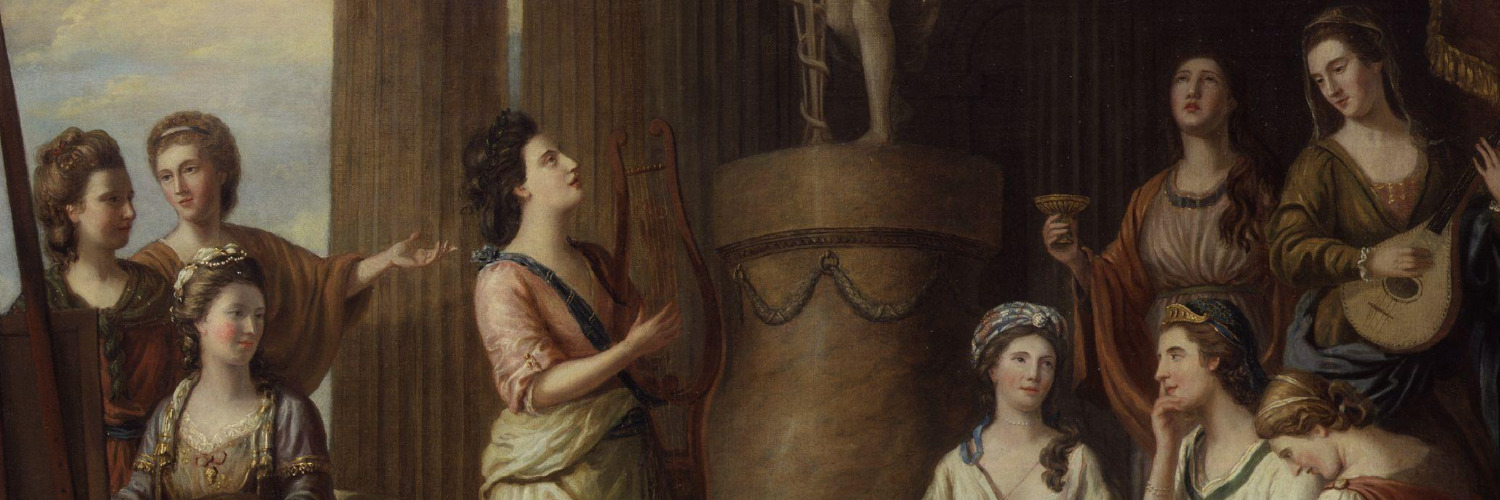- Physical form: One sheet folded into 2 leaves (18.4 x 23.1 cm)
- Cover: Miss Rickards / Church Row / Hampstead
- PM: 7 o’Clock / FE 5 / 1805 N.T.
TwoPyPost / Unpaid / Stoke Newington - WM: W LACIE & CO. / 1801
- SM: Misc MS 4358
I this morning received your kind letter & am much obliged to you for indulging me with it before it was strictly due, if that be the case, for I really do not exactly remember which of us wrote last— I know that as a correspondent I am too often a defaulter, but whenever that happens, if you favour me with a few lines to put me in mind, it will have the best effect in the world. It is heaping coals of fire, you know &c— I am glad to have so good an account of you & Mrs Rickards, which indeed was but a confirmation of what I received yesterday from your fair friend Miss Newman, & Miss Slater,
& I rejoice Mrs Rickards repercieved no bad consequence from her fall, or rather slide for if I understand them ^right^, she was conveyed to the bottom of her steps much in the same way, only without a carpet under her, as Solomon & the Queen of Sheba get to the bottom of the stairs—if ever you played at that antient & delectable
[fol 1v] game
— I beg you will tell good Mrs Plumptre
how sincerely we rejoice in her joy, & ^also^ convey our congratulations to her daughter, that she is once more safe on English ground. Strong is the love of country! I daresay she will, after this absence, receive more pleasure from a walk by Hampstead pond, than ever she did from walking on the Quay of Marseilles & the view of the Mediterannean, & that the orange blossoms & myrtles of Provence & that yield at present to the heath on the common; Pray tell her, we expect from one domesticated so long among the French, a more circumstantial & authentic account than we have yet had of the present state of our neighbours— I am very sorry indeed for Mrs Pryor’s disappointment.
How many a poor couple have children come pouring upon them, to their no small consternation, while the rich want an heir to their possessions! but in this case I hope the blessing is only deferred— You ask how we do. Mr Barbauld is quite well. I have felt the winter, & must expect to feel it more & more, but I am not ill. We may hope now, the severest pinch of the season is over——It would do me a great deal of good to see you, I wish you could spend some days with me. Any time, if you will give me a line, without some engagement
which
[fol 2r] which is not at present likely to happen, I shall be delighted to see you— We have read Mrs Opie’s novel, but as you are reading it also, I had rather have your opinion than give you mine. One thing however is certain, that it is not necessary to write 3 Vols in order to prove that a woman who lives with a man without marriage, will lose her reputation[.]
For, you will observe, her distresses & mortifications all arise from the opinion of the world, not from the nature of the connection itself. She would have been perfectly happy with Glenmurray if she had not been cast out of society, & if he had not died of a consumption; but no woman, I will venture to say, was ever such a martyr to system as to refuse to marry her lover, when he pr[esse]d her to it, & when she meant the connection to be in[dis]soluble. The real danger of such a system, which by the way, is now quite a thing gone by, is that a young woman should, in consequence of it, yield to her passion for a man with whom, from circumstances, marriage is not in her power—There are however pathetic scenes: Glenmurray’s death we were particularly pleased with, & the incident of the pine apple afforded us much discussion— Pray did you know Miss Kelsal one of Mr Gregory’s pupils? Dr Lewin, her very constant lover, is coming this week “to make an end of all his wooing” & carry her to Liverpool.
I always tell young ladies of weddings when I hear of them, just to put them in mind that there are such things——Well farewell;
Mr
[fol 2v] Mr Barbauld joins me in most affectionate remembrances to Mrs Rickards, & a great portion of love to yourself, & as much as you think proper to distribute among all our friends, Miss Baillies’
&c
Your ever affectionate
Feby 5
[at top of cover panel:]
I ordered a copy of the Selections, which is at length come out, for your acceptance, but as you do not mention it, I fear Johnson has neglected to send it
————

